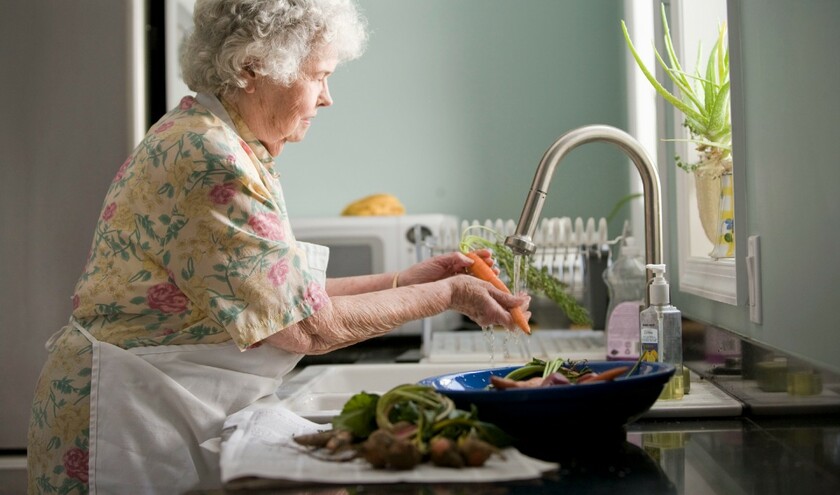The alarming assessment from NHS national medical director, Professor Sir Stephen Powis, came as figures showed staff experienced their busiest year on record for A&E and ambulance services in 2024.
Health and social care secretary Wes Streeting said: ‘Annual winter pressures should not mean an annual winter crisis, which is why this Government is making significant investment in the NHS, undertaking fundamental reform and acting now to improve social care. It will take time to turn the NHS around, but the fact that waiting lists are now falling shows that change is possible.'
Virus surge
There were an average of 5,407 patients a day in hospital with flu last week, three-and-half times the level seen in the week ending 7 January 2024.
Over 1,100 hospital patients had Covid with norovirus cases up almost 50% on the same period last year at 626 and the number of children in hospital with RSV every day at an average of 72.
South Warwickshire University NHS Foundation and Wirral University Teaching Hospital were the latest trusts to declare critical incidents this week, with the latter declaring its second escalation in seven days.
Busiest year
NHS data, meanwhile, confirmed 2024 was the busiest year on record for A&E and ambulance services in England with ambulance incidents hitting a record 806,405 in December, taking the annual total to 8.94m compared with 8.35m in 2023.
A&Es also saw unprecedented demand with 2.35m attendances in December, taking the 2024 total to a record 27.4m compared with 25.6m in 2023.
Waiting lists down
Despite added pressures, NHS staff saw around 150,000 more patients within the four-hour target in December when compared to last year and delivered 1.56m elective treatments in November, equating to record daily treatments (74,129).
The waiting list also continued to fall in November, down 61,413 to 7.48m and the lowest since May 2023.
The longest waits also fell again, with the number waiting more than 18 weeks (3.06m) down almost 4% since last year (3.18m), with the number waiting over a year almost half its peak following the pandemic (221,889 vs 436,127 in March 2021). The proportion of patients seen within 18 weeks was 59.1%, below the Government's March 2026 target of 65%.
Reaction
Sarah Arnold, senior policy lead at The King's Fund, said: ‘Extreme pressures in A&E are the bellwether for a health care system that is under intense strain. Throughout the year, NHS services are run worryingly close to full capacity, and spikes in demand for care when cold weather, flu or other seasonal pressures hit can be catastrophic.'
Tim Gardner, assistant director of policy at the Health Foundation, said: ‘As well as highlighting the enormous challenge facing the Government to recover the 18-week elective care standard by the end of this Parliament, today's stats also reiterate that meeting this goal shouldn't come at the expense of other vital health and care services. Improvements need to be made across the system, including investment in additional capacity in both primary and acute care, new technology and skills to streamline services and boost productivity, as well as long overdue reform and investment in social care.'
Nuffield Trust director of research and policy, Dr Becks Fisher, said: ‘The Government's latest moves to improve planned hospital care and finally bring much-needed reform to the crumbling social care sector are encouraging. But here and now, patients are facing another cruel winter. To break the cycle of winter crisis after winter crisis, we need to see the same long-term thinking – and long-term funding – applied to urgent care. An equivalent plan for these services can't come soon enough.'
Liberal Democrat health and social care spokesperson Helen Morgan said: ‘It is of paramount importance that the new Government grips this crisis urgently. That must start with the health secretary producing an emergency plan in the coming days to protect patients from this ongoing disaster.'
Matthew Taylor, chief executive of the NHS Confederation, said it was ‘vital that the NHS does not face another winter like the last few, which have been some of the worst in its history'.
Taylor added: ‘Our members share the Government's ambitions to reduce waiting lists for routine procedures, but we know we can't sacrifice improvement in emergency care to fund elective care. They require an equal focus and that's what NHS leaders will be working towards.'
Interim chief executive of NHS Providers, Saffron Cordery, said: ‘Despite these serious challenges, trust leaders and their teams across hospitals, mental health, community and ambulance services are pulling out all the stops to care for patients. The boost in the number of patients being seen for checks, scans and procedures and a welcome fall in the number of patients on waiting lists is testament to the hard work and dedication of frontline NHS staff, who deserve our thanks for their tireless efforts.'



